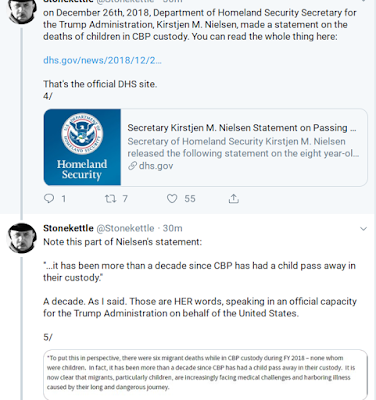Hootsbuddy's New Place is the successor to Hootsbuddy's Place (2004-2009) Still accessible via Web search.
Saturday, December 29, 2018
The Decision to Migrate is Neither Simple Nor Easy
This Axios link is a hand-wringing response to the reluctance of people to pursue "better jobs" by relocating from poor areas to more prosperous environments. Presumably more prosperity for some means more prosperity for all.
Economic opportunity isn't enough to get people moving anymore. And less mobility could mean the wealthy areas of the U.S. continue to accumulate wealth, while the poorer areas will remain poor because people are less likely to move for better jobs and companies are less likely to move for cheaper labor. (emphasis added.)
My Facebook response was this.
"Three years ago, I thought it would be a low point and I thought we would turn the corner," Yun said. We haven't — and it's clear that we don't know all the reasons yet.
The economy is booming, but Americans still aren't moving.
Think about it. When your only tool is a hammer everything looks like a nail. For economic analysts the only measure of assets is finance. However, other variables such as family, friends, customs, history, faith and ethnicity figure in any decision to relocate from one place to another. Non-financial factors are also part of that decision.
The most compelling drivers are
- family
- schools
- age
- employment
- housing
- safety
- health
- opportunity
Money is an inescapable part of the decision, but what is the price of leaving family members needing personal care, transportation to medical appointments and just occasional contact with others? How much is it worth for children to escape bullying, discrimination or unsafe trips to and from school? When a baby comes, how will daycare (or staying home) affect the family lifestyle?
The list is endless, but the greater point is Jefferson's point that "mankind are more disposed to suffer, while evils are sufferable, than to right themselves by altering the forms to which they are accustomed." The decision to relocate to a more prosperous place is literally a revolutionary idea.
Migration within the borders of any country is interesting but not revolutionary. Populations all over the world are essentially the same. Most people want to stay where they are born and reared, even in places others consider dreadful environments -- temperature/climate extremes of arctic or tropical places, promises of mass disaster (volcanoes, floods, earthquakes or "tornado alleys"), areas long dominated by corruption or political conditions too powerful to resist.
Reading this link I am reminded, once again, of the false promises of money and financial security. Part of happiness is knowing when enough is better than more.
Addendum...
(I left this comment at one of Tom Watson's Facebook posts.)
I'm a retiree now but I spent decades in food service management where I encountered a multitude of immigrants from all over the world. I recall a set of twin brothers in the Seventies who had come here following the Hungarian Revolution of the mid-Fifties. My observation is that the first immigrants from other parts of the world tend to be more ambitious and promising than those who come later, but in every case newcomers come with a high level of energy and optimism, pursuing what the whole world understands is The American Dream -- whatever that means in the imaginations of millions.
My layman's opinion is that immigrants from our South, here in the Western Hemisphere, especially Mexico and Central America, are categorically different from the rest of the world in one important way: they are closer to their roots. In years past our Southern border was even more porous than it is today. Workers migrated into the country to work -- either at one place or another for a season, or as migratory farm workers, following the harvest seasons around the country and usually going home or elsewhere to wait for the next growing season. Migratory workers are as essential to apple production in the Northern states as onions here in Georgia. The old bracero program enabled guest workers from the South to do migratory work with regularity but when the border got harder to cross with the maquiladora programs of the Reagan years it became harder for people working in America to return to their families where they would prefer to live.
What I am describing is not very different from most of America where people live in suburbia (sometimes even in other states) where hometown surroundings are not only more familiar but less expensive than living closer to a job. Americans don't need to be reminded about the advantages of commuting, even when it means tiresome, time-consuming delays that might be more enjoyable with the family.
My comment is getting too long, but I think I've made the point.
Our Southern border needs to be porous, not totally blocked, to enable back-migration to enable families to remain near communities with generational roots and cultural ties that are familiar and worth preserving.
What I am describing is not very different from most of America where people live in suburbia (sometimes even in other states) where hometown surroundings are not only more familiar but less expensive than living closer to a job. Americans don't need to be reminded about the advantages of commuting, even when it means tiresome, time-consuming delays that might be more enjoyable with the family.
My comment is getting too long, but I think I've made the point.
Our Southern border needs to be porous, not totally blocked, to enable back-migration to enable families to remain near communities with generational roots and cultural ties that are familiar and worth preserving.
Drugs, smuggling, human trafficking and terrorism will continue to be challenging but an above-ground wall between Mexico and America has little or nothing to do with those problems compared with those created by delaying comprehensive immigration reform.
It's not an original idea with me. I read it somewhere, and the point was how we got the DACA kids. When the border became tougher to cross family members working in America began remitting their earnings by postal service instead of taking them home personally. I don't know what the numbers were, but my guess is that the amounts remitted to Mexico swelled at that point.
Another consequence of tighter border control was that men and boys, lonely without their wives and girlfriends, found it easier to get them here (illegally, of course) than to mess with the border. That's about the time the American-born babies were born, which is why the DACA kids and their undocumented family members include siblings who are legally Americans. The ugly term "anchor babies" was tossed around a few years ago, but it's clear that having an American-born baby was of little or no benefit, since the family risked deportation if they tried to access benefits for any of those children.
If and when the DACA kids receive the kind of fair treatment they deserve my guess is that there are many more (and they, too, should be allowed to register) now living in the shadows, afraid to register for fear of exposing others in their families.
Saturday, December 15, 2018
Jakelin Amei Rosmery Caal Maquin, RIP
I have questions. A lot of questions.— Alyssa Milano (@Alyssa_Milano) December 15, 2018
Jakelin Amei Rosmery Caal Maquin is her name.
She was seven years old.
Jakelin was in Border Patrol custody when she died last week of dehydration and cardiac arrest.#JusticeforJakelin
(THREAD) pic.twitter.com/MMtfQj8IMU
DHS Secretary Nielsen blames Jakelin’s family for her death, but reports today show that Border Patrol failed to give her medical treatment for 90 minutes after her father reported symptoms to CBP officials.— Alyssa Milano (@Alyssa_Milano) December 15, 2018
An hour and a half.
Just imagine her suffering.#JusticeForJakelin
This past Tuesday, days after Jakelin’s death but before it was reported, @CBP Commissioner McAleenan testified at a Senate oversight hearing on migration and border security.— Alyssa Milano (@Alyssa_Milano) December 15, 2018
He never mentioned Jakelin.
Not once.#JusticeForJakelin
Incoming chairman @LindseyGrahamSC, this is on you. With the power of the gavel comes great responsibly. Will you call McAleenan back to testify in January to get us these answers? Will you call Kirstjen Nielsen?— Alyssa Milano (@Alyssa_Milano) December 15, 2018
Americans are watching.
History is watching.#JusticeForJakelin
Subscribe to:
Comments (Atom)





